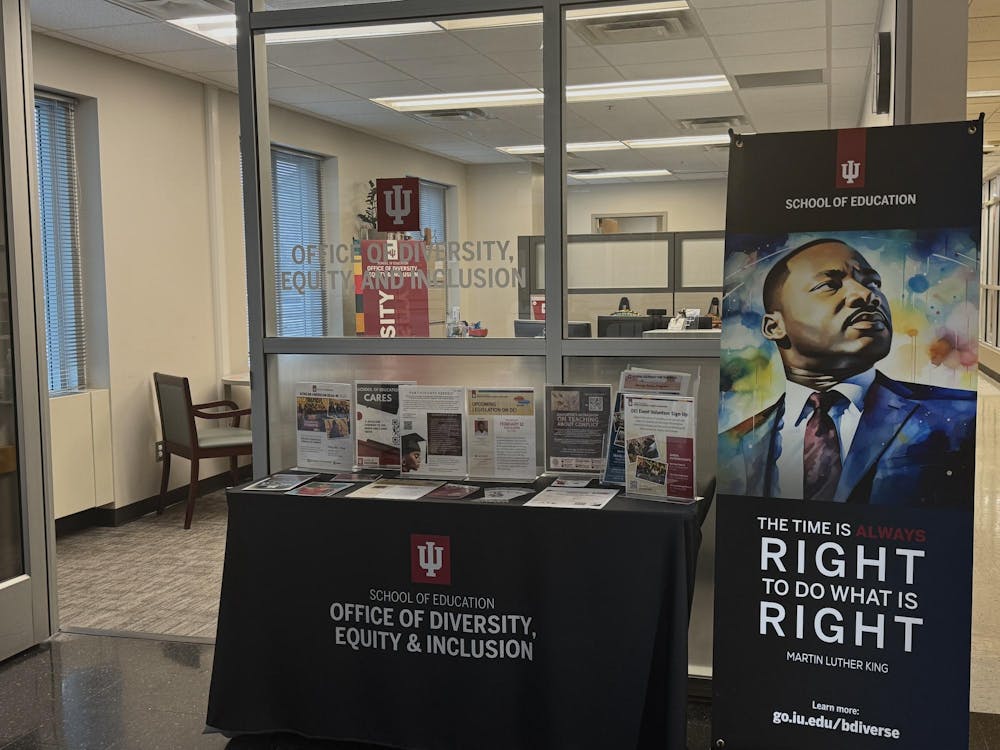Carl Darnell hosted a community conversation about the potential impact of diversity, equity and inclusion related bills and orders on Feb. 12. He is the assistant dean for DEI in the School of Education, where he established the Office of Diversity, Equity and Inclusion.
“I am not a lawyer,” Darnell said. “These are my own opinions and not the opinion of Indiana University or the School of Education. We’re going to have a conversation and if a question comes up, I will do my best to answer.”
Previously, Senate Bill 235 aimed at eliminating DEI efforts in state agencies but was amended and incorporated in Senate Bill 289. Darnell condensed his interpretation of this bill into one sentence:
“My interpretation, not the university’s position, is that you can do whatever you want, as long as you’re not discriminating,” Darnell said.
In its most recent form, the bill defines DEI as any effort to “manipulate or otherwise influence the composition of employees with preference to race, sex, color or ethnicity.” In addition, agencies cannot treat others differently or provide benefits to individuals based on the four categories mentioned above. The bill also prohibits state agencies from promoting policies, procedures, training, programming or activities designed with reference to race, sex, color or ethnicity.
DEI does not include equal opportunity, equal employment opportunity materials or efforts designed to inform individuals. This document also states that programs, services, activities or other efforts to engage students and employees are allowed provided they don’t promote differential treatment and are open to all individuals.
Darnell spoke about this bill in specific relation to the DEI office and officers in state agencies.
“They’re saying don’t use any money that comes from charges, deposits, requests, donations, grants, gifts, income, receipts or any other source to establish or sustain a DEI office or employ, engage or hire an individual to serve as a DEI officer,” Darnell said.
However, a little further down in the bill is where state educational intuitions are specifically mentioned. It states that a state educational institution, like IU may have an office or employ an individual whose responsibility is to develop noncredit programming that promotes both cultural and intellectual diversity.
“In case you didn’t catch that, what that means is we can still do diversity programming,” Darnell said. “It’s in the law. The concern is discrimination.”
According to Darnell, as long as the office or individual does not promote ideals or mandate programming based on the bill’s definition of DEI, they should not be reprimanded.
However, for many attending the meeting, the definition of DEI still isn’t clear. Anjali Gottipaty, president of Graduate and Professional Student Government at IU, explained what conversations are happening in her organization.
“At the graduate faculty council this Monday, we had a discussion about changing the name,” Gottipaty said. “Some of the discussion is about over policing because the language is so confusing. Do we change to avoid possible reprimand or do we not?”
She was referring to changing the language used for DEI positions within GPSG. However, other organizations on campus have already begun removing DEI terminology.
In 2023, the Kelley School of Business administration appointed Robert Thomas to be an associate dean for diversity, equity, inclusion and belonging. His title has since then been changed to associate dean for access, empowerment and societal impact.
Similar conversations are being discussed about scholarship language.
“We don’t want to react before we have to, but we are prepared to revise gift agreements to comply with the law and get it as close to the original donor intent as possible,” Executive Director of Development and Alumni Relations Mary Dwyer said.
Last July, the Equal Protection Project filed a complaint against IU about 19 race-based scholarships. The EPP is a nonprofit organization investigating free speech and expression in universities, businesses and the government. They argued that IU is violating the Equal Protection Clause of the Fourteenth Amendment by providing preferential treatment for scholarships based on a student’s race or national origin.
Scholarships like the ones in the complaint will likely be changed to grant students financial aid while still complying with the law if this bill passes.
SB 289 is still in its early stages and is currently in the prosses of being referred to the House of Representatives after its third reading. Darnell offers advice when asked what faculty and staff can do to support current DEI positions and offices around campus.
“Every time the diversity office has something, come to it,” Darnell said. “The more people and engagement we have, the more support we have.”




